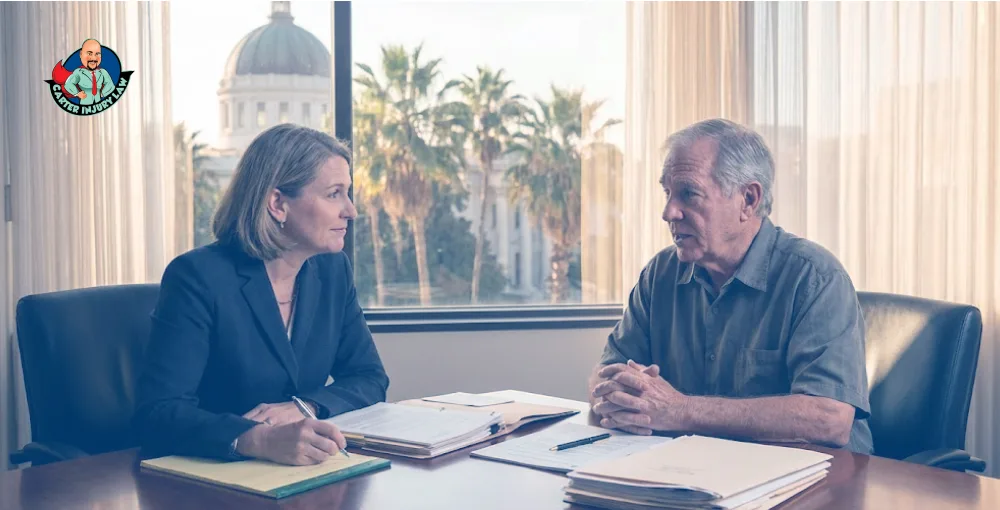Losing a loved one is already a masterclass in misery. Add the possibility that their death could have been prevented, and grief morphs into something darker, a cocktail of anger and unanswered questions.
Families who entrust their relatives to assisted living facilities do so with the hope of safety, dignity, and at least a baseline of competence. However, when that trust is broken, the fallout feels like betrayal disguised as tragedy.
And this leads to the question no one wants to ask but everyone deserves an answer to, can you actually sue an assisted living facility for wrongful death?
If you’d rather skip my rambling paragraphs and hear it straight from Robert Johnson at Carter Injury Law, here’s a short video of your questions questions .
Now that you’ve seen Robert explain the basics, let’s break down exactly what counts as wrongful death in Florida and what families can do next.
1) What Counts as Wrongful Death in an Assisted Living Facility?
In Florida, a wrongful death is a legal definition. It applies when someone dies because another party was negligent, reckless, or outright abusive. Assisted living facilities don’t get a free pass just because they market themselves with brochures full of smiling grandmas playing bingo. They still owe residents a basic standard of care, and when that care collapses, the consequences can be fatal.
A study by the U.S. Government Accountability Office found that over 82% of nursing homes were cited for infection control deficiencies in recent years. If nursing homes are fumbling infection control at that scale, it doesn’t take much imagination to see how similar lapses in assisted living could lead to preventable deaths.
In the context of assisted living facilities, wrongful death could stem from failures like:
Lack of supervision, allowing residents to wander, fall, or suffer unnoticed emergencies.
Ignoring or delaying responses to medical needs, infections, or dehydration.
Creating unsafe living environments, from poor maintenance to hazardous conditions.
Neglecting clear signs of distress that any attentive caregiver should have caught.
Families who hand over their loved ones to these facilities aren’t asking for miracles. They’re asking for competence, safety, and some basic human decency. Florida law agrees that when those standards crumble, accountability is a right.
2) Is There a Difference Between Nursing Homes and Assisted Living Facilities?
People often lump assisted living facilities and nursing homes into the same depressing category, as if they’re interchangeable warehouses for the elderly. However, there’s an important difference, at least on paper.
Nursing homes are healthcare facilities. They are staffed and equipped to provide ongoing medical care, which includes medication administration and chronic illness management.
Assisted living facilities are designed to be a step down, providing assistance with daily living needs such as meals, hygiene, and supervision but not 24-hour medical care.
That distinction sounds neat in theory. In practice, it’s a blurry mess. Families put their trust in assisted living because they believe the facility will keep residents safe, even if it’s not a hospital. Yet, if the staff shrugs off emergencies, ignores medication schedules, or fails to notice obvious distress, that “step down” in care can become a nosedive into tragedy.
Assisted living facilities don’t get to play the “we’re not a medical center” card as a legal shield. Florida law still holds them accountable when negligence leads to wrongful death. And if you’ve ever watched how quickly small mistakes can snowball in fragile health, you know why that duty matters.
3) Who Can File a Wrongful Death Claim in Florida
Not everyone with a broken heart automatically has standing in court. Florida law is pretty specific about who gets to bring a wrongful death claim. The lawsuit has to be filed by the personal representative of the deceased’s estate, which sounds like an intimidating title but usually boils down to the person closest to the victim.
Typically, that means:
A surviving spouse.
An adult child.
A parent.
These representatives act on behalf of all eligible survivors, which means one person steps into the legal ring but the outcome affects the entire family. It’s less about who signs the papers and more about ensuring every loss, financial or emotional, is accounted for.
So if you’re wondering whether you can march into court with your grief and demand answers, the technical reply is maybe, but only if Florida law recognizes you as the one to do it. Otherwise, you’ll be cheering from the sidelines while the official representative carries the fight.
4) What You Can Actually Claim While You’re Busy Grieving
When a family files a wrongful death claim, it isn’t about putting a price tag on a life, it’s about holding a facility accountable for failing to provide the most basic standard of care. Florida law allows families to pursue compensation for a wide range of losses, both financial and emotional.
These damages often include:
Funeral and burial expenses.
Medical bills tied to the final illness or injury.
Loss of companionship and guidance.
Emotional pain and suffering.
Loss of financial support the deceased may have provided.
If those categories sound clinical, it’s because the law likes tidy boxes. Real grief is messier. A study published in The Gerontologist found that nearly 70% of family members of deceased nursing home residents reported significant emotional distress and lasting regret about the quality of care their loved one received.
That statistic doesn’t fit neatly on a claim form, but it underlines why legal accountability matters. Families aren’t just chasing money, they’re demanding acknowledgment that negligence caused harm that never should have happened.
Compensation, in this sense, becomes less about checks and balances and more about justice and closure. It’s a way of saying thatthis death mattered, and it should not have been inevitable.
5) The Clock Is Ticking and It’s Not on Your Side
Nobody who is grieving wants to think about how quickly time passes. Florida gives families just 2 years to file a wrongful death claim. That may sound like plenty of time, but grief has a way of eating months before you even realize the calendar has flipped.
Waiting too long can be disastrous. Facilities don’t exactly keep evidence gift-wrapped for you. Medical records can go missing, witness memories fade, and staff turnover turns key employees into untraceable ghosts. The sooner you act, the stronger the case.
Florida law isn’t trying to rush you through mourning, but it does force a deadline. Two years may be generous if you’re applying for a gym membership, but for a legal fight that requires collecting records, interviewing witnesses, and untangling a facility’s failures, it’s a blink.
So while it feels almost cruel to worry about paperwork while you’re grieving, the statute of limitations makes speed non-negotiable. If you wait, you risk losing not only your case but also the chance to hold anyone accountable at all.
6) Let Us Handle the Legal Dumpster Fire While You Breathe
Let’s be honest, no family wants to spend their mourning period decoding Florida statutes or chasing down facility logs that mysteriously vanish when lawyers get involved. While you’re trying to process a loss, we take on the messy part, the evidence, the paperwork, and the legal chess match the facility will try to play.
Here’s what that actually means:
We investigate the circumstances thoroughly, pulling medical records, facility reports, and witness statements.
We build a case that connects the dots between negligence and loss, because facilities rarely admit fault with a polite press release.
We make sure deadlines, filings, and all the procedural headaches are handled so you don’t have to.
And in case you’re wondering if you’ll be bankrupted by legal fees on top of funeral costs, no, you won’t. Carter Injury Law works on a contingency basis, which means you don’t pay unless we win. The consultation is free, the advice is confidential, and the goal is simple, justice for your family and accountability for theirs.
Grief is enough of a burden. Let us handle the fight.












